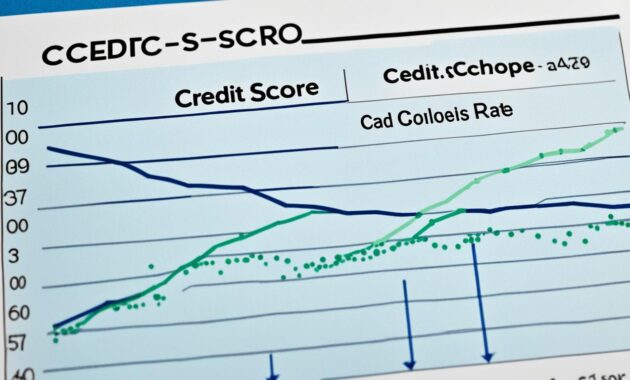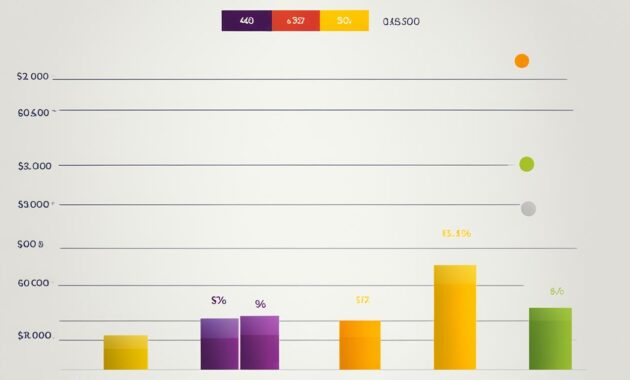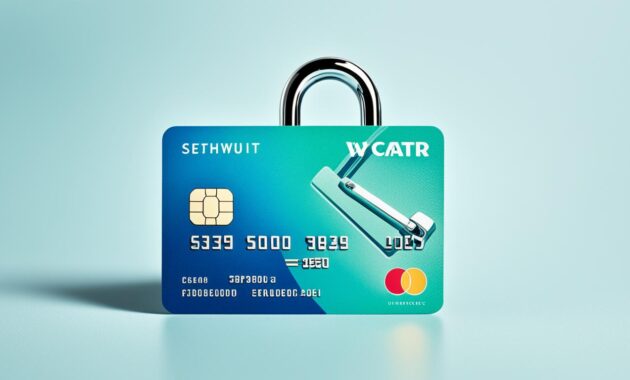If you’re considering applying for a credit card, it’s important to understand the steps you can take to increase your chances of getting approved. Paying attention to certain factors can significantly improve your approval rate and make the application process smoother. In this article, we’ll share 10 essential tips to help you navigate the credit card application process and achieve easy approval.
Applying for a credit card is an important financial decision, and it’s essential to approach it strategically. By following these tips, you can maximize your chances of getting approved and secure the right credit card for your needs. Let’s dive in!
Key Takeaways: Credit Card Application
- Don’t apply for too many cards at once, as multiple applications can negatively impact your credit score and lender perception.
- Check your credit reports for errors and dispute any inaccuracies to improve your application’s chances.
- Apply for credit cards that match your credit score to increase the likelihood of approval.
- Ensure timely bill payments to maintain a positive credit history and demonstrate responsible credit management.
- Monitor your credit utilization rate and aim to keep it below 30% to positively impact your credit score.
Don’t Apply for Too Many Cards at Once
When it comes to applying for a credit card, it’s important to exercise caution and avoid the temptation of applying for multiple cards at once. While it may seem tempting to increase your chances of approval by submitting numerous applications, the reality is that doing so can actually have a detrimental effect on your credit score and overall approval odds.
Each time you apply for a credit card, the credit card company or lender will perform a hard inquiry on your credit report. These inquiries are noted on your credit history and can cause a slight dip in your credit score. When lenders see multiple inquiries within a short period of time, it can be interpreted as a red flag, signaling desperation for credit.
Instead of taking a scattershot approach, it’s better to be strategic and selective in your credit card applications. Take the time to research and compare different cards to find the one that best aligns with your financial needs and credit score. By focusing on quality over quantity, you’ll increase your chances of approval and minimize the negative impact on your credit score.
“Applying for too many credit cards at once can make you appear desperate for credit, which can raise red flags for lenders.”
So, how can you determine the right credit card for you? Start by considering your credit score. Different credit cards have different requirements, and it’s important to choose cards that are suited to your credit profile. For example, if you have excellent credit, you may be eligible for premium rewards cards, while those with fair or average credit may want to focus on cards specifically designed for their credit range.
Take the Following Steps to Avoid Applying for Too Many Cards at Once:
- Research different credit cards and their requirements.
- Consider your credit score and choose cards that fit your profile.
- Focus on quality over quantity; apply for one or two cards at a time.
- Be patient and wait for a response before submitting additional applications.
By following these steps and avoiding the urge to apply for multiple credit cards simultaneously, you’ll improve your chances of approval and protect your credit score in the process.
Check Your Credit Reports for Errors

Before applying for a credit card, it’s crucial to review your credit reports and check for any errors. Inaccurate information on your credit report can significantly impact your chances of approval.
Obtaining a copy of your credit report is simple. You can request a free copy once a year from each of the three major credit bureaus: Equifax, Experian, and TransUnion. To ensure accuracy, it’s recommended to review all three reports, as they may contain different information.
When examining your credit reports, look for any errors such as:
- Inaccurate personal information
- Accounts that don’t belong to you
- Delayed payments that you’ve made on time
- Accounts erroneously marked as delinquent or in collection
If you discover any errors, it’s essential to take action immediately. Start by gathering evidence, such as receipts or statements, to support your claim. Once you have the necessary documentation, you can begin the dispute process.
To dispute an error on your credit report, you need to contact the credit bureau that issued the report. They are responsible for investigating and correcting any mistakes. You can usually file a dispute online or via mail. Provide detailed information about the error and include copies of supporting documents. It’s also helpful to keep a record of all communications related to the dispute.
The credit bureau has 30 to 45 days to investigate your dispute and make the necessary corrections. They will provide you with the results of their investigation in writing. If the error is indeed rectified, the credit bureau will send you a corrected credit report. However, if the bureau determines that the information is accurate, you can include a statement in your credit file explaining your side of the story.
Regularly checking your credit reports and disputing errors is an important step in maintaining a healthy credit profile. By ensuring the accuracy of your credit information, you can improve your chances of credit card approval and enjoy the benefits of responsible credit use.
Apply for Cards That Fit Your Credit Score

When it comes to applying for credit cards, it’s essential to consider your credit score. Different credit cards cater to individuals with varying credit scores. Understanding which cards are suitable for your credit score can increase your chances of approval. Here are some key factors to keep in mind:
- Evaluate your credit score: Begin by checking your credit score to determine where you stand. You can obtain a free credit report from reputable credit reporting agencies like Experian, Equifax, or TransUnion. Knowing your credit score will help you identify cards appropriate for your situation.
- Research credit card options: Once you know your credit score, explore credit cards that are specifically designed for individuals within your score range. Some cards cater to those with excellent credit, while others are more suitable for those with fair or average credit. Researching your options will allow you to choose cards that align with your credit profile.
- Consider secured credit cards: If you have a low credit score or no credit history, secured credit cards can be an excellent option to consider. These cards require a cash deposit that serves as collateral. Secured cards are often easier to obtain since the deposit minimizes the lender’s risk. By responsibly using a secured card, you can build or rebuild your credit score over time.
- Read credit card eligibility requirements: Before applying for a credit card, carefully review the eligibility requirements. Some cards may have specific income or credit score criteria that you need to meet. By ensuring you meet the requirements, you can enhance your chances of approval.
Applying for credit cards that match your credit score is a strategic approach that increases your likelihood of approval. By selecting the right cards, you can enjoy the benefits and rewards that align with your financial situation.
“The first step in getting approved for a credit card is choosing the right one for your credit score.” – Financial Expert
| Card Type | Credit Score Range | Key Features |
|---|---|---|
| Excellent Credit | 700+ | High credit limits, premium rewards programs, low interest rates |
| Good Credit | 670-699 | Rewards programs, moderate interest rates, balance transfer options |
| Fair Credit | 580-669 | Limited rewards, higher interest rates, credit-building opportunities |
| Secured Credit | 300-579 | Requires a security deposit, helps build or rebuild credit |
Understanding where your credit score falls within these ranges will guide you in selecting the right credit card for your financial circumstances.
Ensuring your credit card applications align with your credit score is a smart move that enhances your chances of approval. By choosing the right cards and understanding your credit score, you can take a proactive approach towards building a healthy credit profile.
Pay Your Bills on Time

One of the most crucial factors in credit card approval is your credit history and payment behavior. Consistently paying your bills on time each month not only contributes to a positive credit history but also demonstrates your ability to manage credit responsibly.
When you pay your bills on time, it shows lenders that you are reliable and trustworthy. On the other hand, late or missed payments can negatively impact your credit score and raise concerns about your financial stability. It’s essential to prioritize bill payment and meet your obligations promptly.
To ensure you don’t miss any payments, there are several strategies you can implement:
- Set up automatic payments: Many banks and credit card companies offer the option to set up automatic payments. By enrolling in this service, your bills will be paid automatically from your designated account on their due dates. This can be particularly helpful if you have recurring expenses, such as rent or utilities.
- Use payment reminders: If you prefer to have more control over your bill payments, consider using payment reminders. You can set up alerts on your phone or computer to notify you when a bill is due. This will help you stay organized and avoid any late payments.
By adopting these habits, you can consistently pay your bills on time and establish a positive credit history, which ultimately improves your credit score. Remember, responsible bill payment behavior reflects your financial discipline and enhances your chances of credit card approval.
Benefits of Timely Bill Payment
When you consistently pay your bills on time, you enjoy several benefits:
- Avoid late payment fees: Timely bill payment ensures you won’t have to worry about incurring late payment fees, which can add up and strain your budget.
- Protect your credit score: Late or missed payments can significantly impact your credit score. By paying your bills on time, you maintain a positive payment history, which strengthens your creditworthiness.
- Access to better credit opportunities: A good credit history opens doors to more favorable credit opportunities in the future. With a solid payment record, you may qualify for higher credit limits and preferential interest rates on loans and credit cards.
“Paying your bills on time is not just about avoiding late fees; it’s about taking control of your financial health and building a solid credit foundation.”
| Bill Payment Tips | Benefits |
|---|---|
| Set up automatic payments | Eliminate late payment fees and ensure timely bill payment |
| Use payment reminders | Stay organized and avoid missing payment deadlines |
Watch Your Credit Utilization

Lenders take into consideration your credit utilization rate when assessing your creditworthiness. Credit utilization refers to the amount of credit you are currently using compared to your total available credit. Keeping your credit utilization below 30% can have a positive impact on your credit score.
To illustrate, let’s say you have a credit limit of $1,000. It is advisable to avoid using more than $300 each month to maintain a healthy credit utilization ratio.
By managing your credit utilization effectively, you demonstrate responsible credit management to potential lenders, which can increase your chances of credit card approval.
It’s important to note that credit utilization is just one factor in determining your creditworthiness. Other factors, like making timely payments and maintaining a diverse credit mix, also play a crucial role in building a strong credit profile.
Create a Diverse Range of Credit

Having a diverse credit history is essential for improving your borrower appeal. Lenders consider your credit mix, which refers to the different types of credit you have, including credit cards and loans. By showcasing your ability to manage various types of credit responsibly, you demonstrate your reliability as an applicant.
Diversifying your credit can be achieved by maintaining a balance between different forms of credit. This includes having both revolving credit, such as credit cards, and installment credit, such as a mortgage or auto loan.
Here are some key benefits of having a diverse credit mix:
- Broadened Credit History: A diverse credit mix allows you to build a robust credit history over time. It shows lenders that you have experience managing different types of credit, making you a more attractive borrower.
- Positive Credit Utilization: Utilizing different types of credit responsibly keeps your credit utilization rate in check. This rate compares your outstanding debt to your overall available credit. By spreading out your credit across various accounts, you can maintain a healthy credit utilization ratio.
- Improved Credit Score: A diverse credit mix can positively impact your credit score. Lenders value borrowers with a proven track record of managing different types of credit effectively. This can result in a higher credit score, which opens the door to better borrowing opportunities.
Pro Tip: When managing multiple credit cards, it’s important to keep your balances low and pay off the full amount each month. This responsible credit card usage helps maintain a healthy credit mix and builds a positive credit history.
By diversifying your credit, you demonstrate your ability to handle different financial responsibilities while maintaining a good credit standing. This increases your chances of being approved for future credit applications.
| Type of Credit | Description | Benefits |
|---|---|---|
| Credit Cards | Revolving credit accounts that offer a line of credit with varying limits | – Convenient for regular expenses – Build credit history – Cashback and rewards |
| Loans (Installment Credit) | Fixed-term loans with regular payments over a specific period | – Mortgage or auto loans help establish credit history – Predictable repayment schedule – Potential for tax benefits |
| Lines of Credit | Pre-approved credit line that can be used for various purposes | – Flexibility to borrow as needed – Only pay interest on the amount used |
Remember, while having a diverse range of credit is beneficial, it’s crucial to use credit responsibly and make timely payments on all accounts. Building a strong credit mix takes time and consistent financial management, but the long-term rewards are worth the effort.
Consider a Secured Card to Build Credit History

If you have a thin credit history or bad credit, it can be challenging to qualify for an unsecured credit card. However, there is an option that can help you build your credit history and improve your chances of approval for a traditional credit card: a secured card.
A secured card requires a cash deposit that becomes your credit limit. This deposit acts as collateral for the credit card issuer, giving them assurance that they will be repaid even if you are unable to make the payments. Secured cards are often recommended for individuals who are new to credit or have a low credit score.
By obtaining a secured card and making on-time payments for several months to a year, you can establish a positive credit history. The card issuer reports your payment activity to the credit bureaus, helping to build your credit profile. Over time, as you demonstrate responsible credit management, you may become eligible for an unsecured credit card with a higher credit limit and better benefits.
Building credit with a secured card allows you to demonstrate your ability to manage credit responsibly and can increase your chances of approval for future credit applications.
When choosing a secured card, look for one that reports to all three major credit bureaus, offers a reasonable interest rate and fees, and has a path to transition to an unsecured card. Compare different secured card options to find the best fit for your needs and financial situation.
Benefits of a Secured Card:
- Opportunity to build credit history
- Potential approval despite thin credit history or bad credit
- Ability to transition to an unsecured card over time
Considerations before Applying for a Secured Card:
- Ensure the card issuer reports to all major credit bureaus
- Compare interest rates and fees
- Review the terms and conditions of the card
Example Table: Top Secured Cards
| Card | Annual Fee | Minimum Deposit | APR |
|---|---|---|---|
| Capital One Secured Mastercard | $0 | $49, $99, or $200, based on creditworthiness | 26.99% (Variable) |
| Discover it Secured | $0 | Minimum $200 | 22.99% (Variable) |
| Citi Secured Mastercard | $0 | $200 | 22.49% (Variable) |
These are just a few examples of secured cards available in the market. Remember to carefully review the terms and conditions, fees, and credit reporting policies before applying for a secured card.
Using a secured card responsibly can help you establish a strong credit foundation and improve your creditworthiness, leading to increased approval chances for future credit applications.
Find a Co-Signer

If you have no credit or bad credit, finding a co-signer can significantly increase your chances of getting approved for a credit card. A co-signer is someone with a good credit history who agrees to be responsible for your debt if you cannot make the payments. This provides added security for the credit card issuer, increasing their confidence in approving your application.
When choosing a co-signer, select someone who has a solid credit history and is willing to take on the responsibility. It’s crucial to communicate openly with your co-signer about your financial situation and ensure they understand the potential risks involved.
Having a co-signer not only improves your chances of approval but can also help you start building a positive credit history. As you make timely payments and demonstrate responsible credit behavior, it will reflect positively on both your credit report and that of your co-signer.
Alternatively, another option to consider if you have no credit or bad credit is to be added as an authorized user on someone else’s credit card account. This allows you to benefit from their positive credit history without the co-signer’s full responsibility.
Build Credit Early and Apply at Your Bank or Credit Union
Building credit early is crucial for increasing your chances of getting approved for a credit card. It’s essential to start establishing your credit history as soon as possible to show lenders that you are a responsible borrower. By obtaining credit early, you give yourself more time to develop a positive credit history.
To build credit, consider opening several accounts and managing them responsibly. This can include credit cards, loans, or even utility bills. By having multiple open accounts in good standing, you demonstrate your ability to handle credit wisely.
When it comes time to apply for a credit card, consider turning to your bank or credit union. Applying for a credit card at an institution where you already have a relationship can work in your favor. Banks and credit unions often have a better understanding of your financial situation and may be more willing to approve your application, especially if you have a positive history with them.
When you’re ready to apply for a new credit card, you can conveniently apply online and explore various card offers to find the one that fits your needs, whether it’s cash back credit cards or Visa® credit cards.
Before you apply, it’s essential to check your credit score and understand how applying for a card may impact it, especially if you have fair or excellent credit. Applying for credit cards involves submitting a credit card application, which typically requires your social security number and a copy of your credit report, as the card issuer will pull your credit to assess your creditworthiness. If you’re looking to build or rebuild your credit, you may consider applying for a secured credit card, which can help improve your credit history with responsible use.
As you manage your credit card, it’s crucial to understand common credit card terms and use the card for purchases to build up your credit. Remember, your credit card limit is based on your credit, so responsible use can positively affect your credit score over time.
Also Read : Get Your Instant Approval Virtual Credit Card Now!
FAQs
Q: What are some tips for getting approved for a credit card?
A: To improve your chances of approval, make sure to check your credit score, choose a card that matches your credit profile, and apply for a card that fits your financial needs.
Q: How can I check my credit score before applying for a credit card?
A: You can check your credit score for free through various online platforms or by requesting a copy of your credit report from the major credit bureaus.
Q: What is the importance of knowing my credit score before applying for a credit card?
A: Knowing your credit score helps you understand which credit cards you are eligible for and allows you to apply for cards that suit your credit profile, increasing your chances of approval.
Q: What is a secured credit card, and how can it help improve my credit?
A: A secured credit card requires a security deposit and is designed for individuals looking to build or rebuild their credit. By using a secured card responsibly, you can improve your credit score over time.
Q: What are some factors to consider when choosing a rewards credit card?
A: When selecting a rewards credit card, consider the rewards structure, annual fees, interest rates, and whether the rewards align with your spending habits and preferences.
Q: How can I compare and apply for credit cards online?
A: You can use online comparison tools to compare credit card offers based on features, rewards, fees, and terms. Once you find a card that suits your needs, you can easily apply for it online.
Q: What should I do to improve my credit score before applying for a new credit card?
A: To boost your credit score, pay your bills on time, keep your credit card balances low, limit new credit applications, and monitor your credit report for errors.
Q: Can applying for multiple credit cards at once hurt my credit score?
A: Yes, submitting multiple credit card applications within a short period can temporarily lower your credit score as it may be seen as a sign of financial distress or irresponsible behavior.
Source Links
- https://www.nerdwallet.com/article/credit-cards/10-tips-credit-card-application-approved
- https://www.nerdwallet.com/article/credit-cards/apply-for-a-credit-card
- https://www.cnbc.com/select/how-apply-credit-card-and-get-approved/